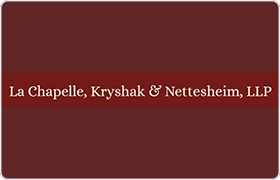 Stevens Point Family Law Lawyers, Wisconsin
Stevens Point Family Law Lawyers, Wisconsin
Sponsored Law Firm
-
 x
x

Click For More Info:
-
La Chapelle, Kryshak & Nettesheim, LLP
262 W Grand Ave Wisconsin Rapids WI 54495» view mapDivorce & Family Law Passionate and Dedicated Attorneys
The law firm of La Chapelle, Kryshak & Nettesheim, LLP, has provided legal services to the people of central Wisconsin for over a century.
800-886-1251
Includes: Collaborative Law, Domestic Violence & Neglect, Paternity, Prenuptial Agreements
Lawyers
1-1 of 1 matches



 Nicholas Abts Wisconsin Rapids, WI
Nicholas Abts Wisconsin Rapids, WI AboutLa Chapelle, Kryshak & Nettesheim, LLP
AboutLa Chapelle, Kryshak & Nettesheim, LLP Practice AreasExpertise
Practice AreasExpertise